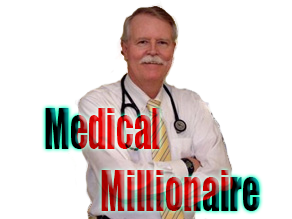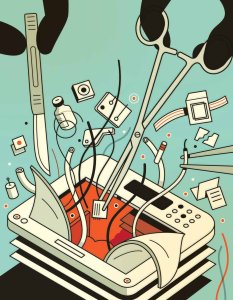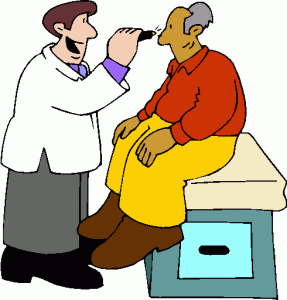 I attended a meeting last night that emphasized to me why it is not only a nice goal to become a medical millionaire, but why it is a vital goal.
I attended a meeting last night that emphasized to me why it is not only a nice goal to become a medical millionaire, but why it is a vital goal.
Some background first: I attended a meeting of family practitioners in my local area to share with them data collected from insurance companies, and to help them to use the data to improve their practices and patient care. Insurance companies offered extra payments to the doctors and practices to reinforce this behavior if these doctors reached certain benchmarks.
I have been the medical director of a local physician hospital organization, or PHO, for the past 20 years. This PHO was formed back when the advent of HMOs came into this area and exerted their financial power to reduce the amount they were paying for medical care.
I have learned over the years to be somewhat cynical about the field of health insurance. Health insurance companies are basically financial and for-profit institutions whose main purpose is to collect premiums from patients and employers, and pay out as little as possible.
If you look at health insurance that way, it explains a lot of their behavior. I have nothing against profit or capitalism, but let’s at least be up-front about the economic model with which we are dealing, and not pretend that they are altruistic entities.
 Being a group of hard working and dedicated doctors, the data on these doctors in this PHO were actually quite good in terms of multiple quality parameters such as rates of mammograms, pap smears, and colonoscopies. We had discussions about office and PHO procedures that could help out and improve the rates of these necessary procedures.
Being a group of hard working and dedicated doctors, the data on these doctors in this PHO were actually quite good in terms of multiple quality parameters such as rates of mammograms, pap smears, and colonoscopies. We had discussions about office and PHO procedures that could help out and improve the rates of these necessary procedures.
All was well and good, until the very end when several members “let their hair down.” It was then that frustrations boiled to the surface on several fronts.
 One doctor railed against the high price points of many tests performed in the local hospital, such as MRIs and colonoscopies, compared to other locations in our state. Many local patients who either have no insurance or high-deductible insurances were finding it hard to pay for necessary tests, and expressing their frustrations to their point people in the health care system, namely their PCP.
One doctor railed against the high price points of many tests performed in the local hospital, such as MRIs and colonoscopies, compared to other locations in our state. Many local patients who either have no insurance or high-deductible insurances were finding it hard to pay for necessary tests, and expressing their frustrations to their point people in the health care system, namely their PCP.
Another doctor talked about the disrespect he felt from others within the medical community, including hospitalists and specialists. He complained about having to deal with unreturned phone calls and medical community members being unreceptive to information about his common patients that the PCP had from years of working closely with them.
Then the discussion turned to money, of course. Specialists, including hospitalists in our area, earn 2-3 times the income of the primary care providers, while it is the PCPs who are under the most scrutiny from the insurance companies, hospitals and other rating agencies in terms of quality.
 One independent PCP, who is a 2-person practice, talked tearfully about how hard is to remain independent in a practice when the economic landscape is tilted away from the doctors who are doing the vital primary care work. After all, everyone agrees that this work is the bedrock of health care.
One independent PCP, who is a 2-person practice, talked tearfully about how hard is to remain independent in a practice when the economic landscape is tilted away from the doctors who are doing the vital primary care work. After all, everyone agrees that this work is the bedrock of health care.
Part of the reason I got involved in the local physician-hospital organization is to have some control over the economic process of medical care. I saw the train coming down the tracks in terms of the power significantly shifting away from the doctors to the health insurance industry.
Yes, I was still the one on the line seeing the patients, prescribing the medications and the testing, and paying the employees, rent, & other expenses. However, someone else was wresting away more of the control on my ability to have the income flow to pay those expenses and, eventually, my own income.
An older doctor, who was on the board of our PHO until he retired several years ago, said a very succinct comment on this situation that I still remember to this day. He said, “The golden rule of business is not do unto others as they would do unto you, as it says in the Bible. Rather, it is he who has the gold who makes the rules.”
 Knowing how to negotiate with these financial entities that were controlling the income flow was vital to my financial future. I always realized that I had to have multiple ways to make income so that a pinch in one aspect of the flow would not strangle my income and life.
Knowing how to negotiate with these financial entities that were controlling the income flow was vital to my financial future. I always realized that I had to have multiple ways to make income so that a pinch in one aspect of the flow would not strangle my income and life.
In later blog posts, I will go into more detail about how I accomplished that feat. However, my most important accomplishment was the mental leap and the realization that I did not want to be controlled by a system that was skewed against me.
All these ideas were flowing through my mind as I was listening to these family practitioners lament their plight and venting their sense of powerlessness. I always wanted to be in the position of having the entities that wanted my work need me more than I needed them.
Another older M.D. mentor of mine from the early days of my practice once counseled me to “structure your practice (business) such that even if the hospital were to implode, you could still make a living.” You can certainly substitute insurance company or Medicare for the hospital in that counsel.
 Unfortunately, I also realized that many of the hard-working doctors were not just railing at the injustice of this current reimbursement system, but also feeling like they are on a treadmill over which they have no control. They still need to work in this system despite its unfairness because they have massive financial obligations including student loans, mortgages, and future college expenses for their children that require them to continue on this treadmill.
Unfortunately, I also realized that many of the hard-working doctors were not just railing at the injustice of this current reimbursement system, but also feeling like they are on a treadmill over which they have no control. They still need to work in this system despite its unfairness because they have massive financial obligations including student loans, mortgages, and future college expenses for their children that require them to continue on this treadmill.
I don’t want this blog post to be a complete bummer. I do think that there is hope.
In fact, I feel that I have managed to thread the needle by approaching the medical/financial system with a business perspective and handling personal finances as if I were a corporation. This mindset has allowed me to build and manage multiple multimillion-dollar medical enterprises while also amassing large retirement funds, investment portfolios, and real estate holdings.
I wish I could have piped into the PCP discussion with that message of hope. However, it was not an appropriate message for that particular meeting.
But for this blog, I still attest that there IS hope, and there are multiple ways to navigate the ever-changing medical and economic environment and still come out a winner at the end. Stay tuned!
 The recent gyrations of the stock market had me remembering an old expression about Wall Street investing: “Bulls make money, bears make money, but pigs get slaughtered.”
The recent gyrations of the stock market had me remembering an old expression about Wall Street investing: “Bulls make money, bears make money, but pigs get slaughtered.” Nothing at all really, other than buying equities through my maximum 401k contributions this week and two weeks ago. Why am I so cool, calm and collected about the stock market, you ask?
Nothing at all really, other than buying equities through my maximum 401k contributions this week and two weeks ago. Why am I so cool, calm and collected about the stock market, you ask? My best advice is to stay with the plan that has already been worked out by the greatest financial minds. Use the power of dollar cost averaging, compounding, diversification of your portfolio, and long range focus.
My best advice is to stay with the plan that has already been worked out by the greatest financial minds. Use the power of dollar cost averaging, compounding, diversification of your portfolio, and long range focus.





































